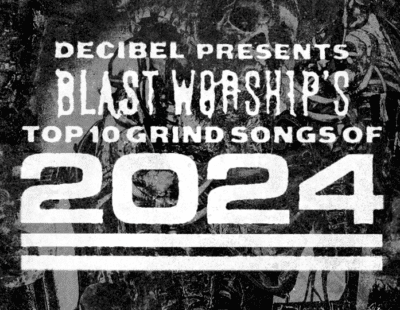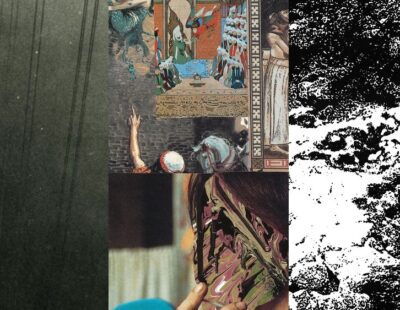Throughout rock ‘n’ roll history (we’re talking proto-metal here), J.R.R. Tolkien’s The Hobbit and The Lord of the Rings have influenced heavily. Whether it’s lyrical references or inspiration — such as Led Zeppelin’s “The Battle of Evermore” and “Ramble On” or Rush’s “The Necromancer” and Rivendell” or Black Sabbath’s “The Wizard” — or bands taking Tolkien-named places, things, persons to call their own, rock, metal, and all their relevant sub-genres owe much to Tolkien. Death metal and black metal, of course, are no exception.
As with Led Zeppelin, Black Sabbath, Uriah Heep, Rush, etc., so too with our Top 5 list of bands who’ve taken from Tolkien’s literary world and, in many cases, subsumed the word as something not entirely from The Hobbit or The Lord of the Rings or The Silmarillion. For example, California-based proto-doom heroes Cirith Ungol were clearly inspired by the darker aspects of Tolkien’s work. Same with veteran German death metallers Morgoth and chart-toppers Amon Amarth. But black metal owes most to master Tolkien. Bands of the genre have appropriated mystical names — some often derived from Norse and Celtic myths — from books inspired by involvement in World Wars and Tolkien’s own anti-industrial society bent to heighten the magical nature of their music. Like Norwegians Gorgoroth and, of course, Burzum. So, read on fellow Númenóreans. Agree or argue with our list… There’s plenty of space in Middle Earth for it.
5. Morgoth
Morgoth or Melkor was, in effect, Satan. God was essentially Eru Ilúvatar. That Morgoth will eventually rise again to terrorize Middle Earth isn’t that dissimilar to Satan emerging for the final battle. Either way, Morgoth was an excellent choice for German-based death metallers from North Rhine-Westphalia. It described in two syllables the power of death metal, as inspired and informed by Death musically, coming to age in the late ’80s/early ’90s in Europe. Said vocalist Marc Grewe in an interview with Voices from the Darkside: “Back in 1987 – we were all about fifteen years old back then – we were all huge fans of Tolkien’s book Lord Of The Rings. It was about the most impressive book we ever read, you could totally imagine how the different characters of the book would look like. And the evil figures and characters from that book were like the ideal source of inspiration when we were looking for the right name of our band.”
4. Cirith Ungol
Legendary heavy metal (OK, proto-doom) act Cirith Ungol were obviously taken by Tolkien’s Lord of the Rings and other high fantasy authors like Michael Moorcock, from which the band plucked cover art. The name they picked was either named after a mountain pass in Mordor or the tower that guards it. It certainly has a strange ring. Like most names metal bands have picked over the ages, Cirith Ungol is Sindarin in origin, where ‘cirith’ translates to ‘pass’ and ‘ungol’ is a direct reference to the spawn of Ungoliant. ‘Ungol’ translates to ‘spider’. The Californians eventually even had a song about Cirith Ungol on the awesome King of the Dead album. Either way, while it stands to reason most contemporary bands would have a name appropriated from Tolkien, remember the ’60s and ’70s were times when Tolkien’s works, particularly The Hobbit, were increasingly part of literary culture changes.
3. Gorgoroth
Norwegians Gorgoroth weren’t the first or last to use a word from Tolkien’s storied universe. The word ‘gorgoroth’ is Sindarin for ‘horror’ and it perfectly describes the plateau upon which Gorgoroth was named. Gorgoroth was a wasteland in Mordor, a landscape corrupted by evil, where fissures croaked toxic fumes and deadly flame. It was a land completely devoid of life, save for Sauron’s malign minions who presumably lived or trained on it. Presumably, the band aren’t inspired by Tolkien’s dark imagination as none of their albums have addressed — to our knowledge — the plateau, its description, or its concept. Then again, Gorgoroth aren’t a band willing to publish lyrics. This is true up to the albums featuring Gaahl and the albums after.
2. Amon Amarth
Amon Amarth or Orodruin or Mount Doom. In Sindarin Amon Amarth was called Orodruin where ‘orod’ and ‘ruin’ meant ‘mountain’ and ‘red’, respectively. Likewise, Amon Amarth was also Sindarin for ‘hill’ and ‘doom’, respectively. As for the Swedes, they merely used the Tolkien-derived name because, as frontman Johan Hegg said in a 1999 Metal Observer interview, it sounds “mystical” and “powerful”. They weren’t necessarily bound to Tolkien’s world. To wit, the demos and albums to come out of the Swedes haven’t touched upon, in any detail, the name Amon Amarth or what it originally signified. But like so many metal bands who’ve taken words, names, places, and other artifacts from Tolkien, Amon Amarth have proven their association to the word is stronger than Tolkien’s. At least for now.
1. Burzum
Varg Vikernes first project was named Uruk-Hai, a direct reference to soldier-orcs of Isengard and Mordor, but after time with Old Funeral, Varg surfaced with his new project named, yet again after a Tolkien word, Burzum. In Tolkien’s Black Speech, the word ‘burzum’ means ‘darkness’, which is suitable considering Varg’s teenage fascination with role-playing games and black metal. The word ‘burzum’ is famously used in the One Ring inscription. Varg eventually disowned, to a degree, the importance of the name of Burzum, although he still uses it today for marketing purposes, because Tolkien was a practicing Roman Catholic. But the power of Varg’s albums, influence, and controversies have, over time, eclipsed that of Tolkien himself and the franchises that have licensed his creative endeavors from the Saul Zaentz Company. Google ‘burzum’. Varg’s website, burzum.org and Burzum’s Wikipedia page, are top of the search results. Varg has, in effect, subsumed Tolkien’s word.
** Honorable mentions: Isengard, Cirith Gorgor, Ephel Duath, Gandalf, Numenorean, Helcaraxë, Falls of Rauros, and Carach Angren.












